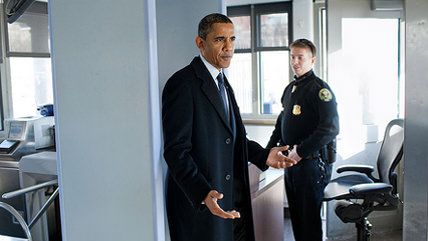Big Brother Is Watching You
Politicians may be fine with the surveillance state, but they can't force you to be.

Late last month President Obama told the American people the War on Terror should start winding down. Unfortunately he forgot to tell the NSA.
But the president's oversight was no mistake. As Robert Higgs documented in Crisis and Leviathan, government uses crises to amass powers that it continues to wield long after the crises have passed. Higgs' insight was not original – he simply provided historical support for William Pitts' observation ("necessity is the plea for every infringement of human freedom") and Madison's admonition ("free men must guard against the old trick of turning every contingency into a resource for accumulating force in government").
On Friday, the president insisted the federal agencies conducting dragnet surveillance of U.S. electronic communications were not listening in on Americans' calls. This would be more reassuring if past administration reassurances had contained more truth – if, for example, a YouTube video actually had provoked the attack on the U.S. embassy in Benghazi. Or if the IRS' harassment of Tea-Party groups really had been nothing but a renegade operation by low-level rogues (the Cincinnati office "had no autonomy at all through the process," said IRS agent Elizabeth Hofacre on Friday). Or if the administration really had not imposed any taxes on middle-income families, as the president had promised. Or if Obamacare really did let everyone who likes his current insurance policy keep it.
Or if Director of National Intelligence James Clapper Jr. had not lied when, in a congressional hearing, he was asked whether the NSA collects "any type of data at all on millions or hundreds of millions of Americans." His answer: "No sir."
The president also sought to reassure the public about dragnet surveillance by pointing out that it was not a renegade operation, either. In fact, it requires regular approval by judges. Members of Congress also receive regular briefings.
This is supposed to make people feel better?
The Bush administration conducted warrantless wiretaps without court approval and kept lawmakers in the dark. When news of that program broke, the public could take some comfort in knowing the activity had been conducted without approval or oversight by the other two branches of government. Now the public is led to understand that under Obama, all three branches are condoning what was once so widely condemned. Oh joy.
And condone it they have: The Washington Post reported on Saturday that the annual number of warrant requests for domestic electronic surveillance has tripled since 9/11, to about 1,700 per year – and the approval rate hovers around 99.97 percent.
Leading members of Congress are defending the surveillance as well. Sen. Dianne Feinstein – one of the original sponsors of the PATRIOT Act – says the surveillance accesses only "metadata," not the contents of conversations, so no biggie. Besides: "It's about protecting the country." (Cf.: Pitt, Wm., op. cit.)
But as Sun Microsystems engineer Susan Landau told The New Yorker, metadata can tell you a lot. For instance: Metadata lets you "see a call to a gynecologist, and then a call to an oncologist, and then a call to close family members." After that, you can fill in the blanks.
That Obama has extended Bush-era war power he once deplored has infuriated many liberals. Meanwhile, some conservatives are applauding. Karl Rove, for instance, supports what the intelligence community is doing. Then there is GOP Sen. Lindsey Graham, recently heard wondering whether the First Amendment applies to bloggers. (FYI: It does.)
Graham says he is "glad" the NSA is monitoring phone traffic. He doesn't mind the government tracking his calls, he says, because he isn't talking to terrorists. And nobody else who isn't talking to terrorists has "anything to worry about" either he says.
Graham's argument seems to be that it's okay to spy on you if you're innocent. And since it's obviously okay to spy on the guilty, then it's okay to spy on everyone, all the time. Graham also is likely being disingenuous. Since he hasn't stolen any cash, would he mind if you looked through his wallet? He very well might.
Then again, maybe not. Let's assume Graham really doesn't mind the government invading his privacy. He can even consent to a strip-search, if he wants to. What he can't do is consent to one on your behalf. Just because he doesn't mind the government invading his own privacy doesn't give it the authority to invade yours. But he seems to think otherwise -- and he has a lot of company on both sides of the aisle.
In recent years we have heard a lot of hand-wringing over "divided government." Isn't it just awful, say many well-meaning folk, that Republicans and Democrats in Washington cannot seem to come together and unite for a common purpose?
As it turns out, they have: Many are united for the common purpose of spying on the American public. The result, says Yale law professor Jack Balkin, is a surveillance regime that is now "a permanent fixture of American security policy." Be careful what you wish for.
This column originally appeared in the Richmond Times-Dispatch.
Show Comments (28)